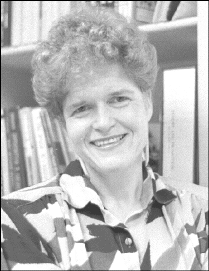 Deborah Lipstadt's website at Emory University
Lipstadt mesmerizes crowd Emory University Emory Report September 18, 2000, Volume 53, No. 4 http://www.emory.edu/EMORY_REPORT/erarchive/2000/September/ersept.18/9_18_00lipstadt.ml
By Eric Rangus An overflow crowd at Tull Auditorium greeted Deborah Lipstadt with three standing ovations, as she and fellow speaker Rabbi Norman Lamm kept the more than 700 attendees captivated with often emotional discussion on the Holocaust. "Holocaust Denial: Theological Reflections," which is part of the University's Year of Recon-ciliation, ran more than two hours and touched on many subjects including Lipstadt's trial, the idea of reparations paid to Holocaust victims and the evil of Holocaust deniers. The Institute for Jewish Studies, the Law and Religion Program and the Jewish Federation of Greater Atlanta co-sponsored the discussion, which saw crowd members standing in the aisles of Tull and more than 200 seated and standing just outside, watching the proceedings on monitors. The event marked Lipstadt's first major public appearance at Emory since she emerged victorious from the libel trial brought against her in Great Britain by author David Irving. Irving had sued Lipstadt for calling him a "Holocaust denier" in her book Denying the Holocaust: The Growing Assault on Truth and Memory. Lamm has been president of New York's Yeshiva University for 25 years. An author, rabbi and philosopher, Lamm's writings have been cited in two Supreme Court decisions-the Miranda case in 1966 and a 1967 case involving guarantees against self-incrimination. In his introduction of Lamm, President Bill Chace said he was the first sitting university president to ever speak at Emory. Lamm does have certain connections to Emory. He acknowledged David Blumenthal, Cohen Professor of Judaic Studies, as a student of his from junior high school. And in May of this year Yeshiva University presented Lipstadt with an honorary degree, her first following the trial. The focus of Lipstadt's address centered on her mindset during the trial in London and her emotions following it. During the proceedings, she rarely commented to the press. This was a strategic move and one she said was difficult. "It was a time of silence, and that may have been the most challenging part of trial," she said. Especially, she continued, for someone who was used to speaking her mind. Her intent and that of her lawyers was to choke off the loquacious Irving' s press coverage (he went so far as to invite journalists into his home). The tactic worked, as many journalists would not seek Irving's comments without accompanying ones from Lipstadt. Mixed in with her appreciation for all the support she received from the Emory community were several sharp comments about Irving and others who deny the Holocaust. "If I had to do it all over again, I would do exactly the same thing," Lipstadt said. "Except for one thing, I would've written even more harshly about him." During the discovery process, she said she learned a great deal more about his anti-Semitic views. While she admitted she often felt alone during the trial, it was after its conclusion that Lipstadt realized exactly the opposite was true. "My victory was [the Holocaust survivors'] victory," she said. "I had always been around survivors, but this was different. If I lost, survivors would feel that their memories were held up to public ridicule. Over the past five years I have been given the opportunity to stand up for those who can no longer stand up for themselves." Those thoughts were among several that provoked an emotional reaction throughout the crowd. Another came when Lipstadt related a story about an elderly man she was talking with outside the London courtroom. He said he was from Hamburg, Germany, and asked her about a man named Gustav Lipstadt, someone he knew as a boy. Gustav, Lipstadt said, was her grandfather, whom she never knew. She never got to ask her father about him since her father died when she was 22. As far as asking the man in the courtroom about him . . . Lipstadt never saw him again. Lamm's discussion centered on two primary themes: the silence of Great Britain during and after World War II regarding the Holocaust, and the issue of reparations payment to Holocaust survivors. Lamm framed his discussion within the context of Jewish law, which consists of the laws of man and what he called "heavenly law." Lamm said crimes committed on earth are punishable by both, while the crime committed by Britain -- not speaking out against the Holocaust although British intelligence was aware of the crisis in the early days of the war -- was a crime of inaction, which is a moral and punishable only by heavenly law. "An onlooker who refuses to help has much to explain to history and heaven," Lamm said. "Silence in the face of evil, although not legally punishable, is morally evil." Regarding reparations, Lamm said those nations who stole properties from Jewish families-not only Germany but her allies, as well as nations who profited from this thievery (even Allied countries such as Britain or the United States)-had a moral responsibility to return the goods, or at least a monetary equivalent. This, too, has its roots in Jewish law. One audience member asked Lamm his opinion on reparations payments to other groups, such as Native Americans and the descendents of American slaves. "To hold onto the fruits of crime is morally outrageous," Lamm said. "Countries are honor-bound to make restitution." Lamm replied that some reparations are already present-in
the form of tax breaks to Native American Indians, for
instance. He added that, since the Holocaust took place in
our lifetime, it carries added importance.
Relevant links: |